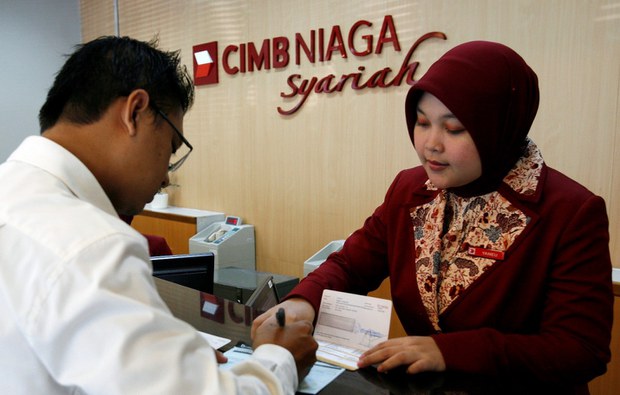Many Banks in Indonesia’s Sharia-Ruled Aceh to Shut Conventional Operations
2021.05.06
Banda Aceh, Indonesia
 A teller helps a customer with a transaction at a branch of the CIMB Niaga Syariah bank in Jakarta, Feb. 17, 2010.
A teller helps a customer with a transaction at a branch of the CIMB Niaga Syariah bank in Jakarta, Feb. 17, 2010.
Muslims in Indonesia’s Aceh province will be required to patronize Islamic financial services beginning next year, due to a local bylaw that has led several banks to shutter their traditional operations in the Sharia-ruled region, but one Muslim customer is suing to stop the trend.
Lawyer and activist Safaruddin said the closures hurt customers because Islamic banking doesn’t allow interest-bearing loans – unlike at conventional banks – and borrowed money has to be in the form of a trade or business agreement.
“There is not a single provision [in the bylaw] that conventional banks must close. That’s a misperception,” Safaruddin, who is suing three state-owned banks for stopping their traditional services in Aceh, told BenarNews.
“This may be a small thing but it affects us directly.”
Non-Islamic banks provide better services, said the lawyer who filed his suit last December.
Unlike their conventional peers, Islamic banks do not charge interest. Under the sharia banking system, a borrower shares profits or losses with the bank rather than paying interest.
“The Islamic financial system employs the concept of participation in the enterprise, utilizing the funds at risk on a profit-and-loss-sharing basis,” said the Institute of Islamic Banking and Insurance.
That means an Islamic bank earns a share of whatever profit a borrower makes, in addition to being repaid the loan, according to the website of Helen Ziegler & Associates, a firm that advertises jobs in Saudi Arabia.
The Aceh bylaw, or qanun, on Islamic financial services was passed in 2018. It requires all banks to operate based on Islamic principles. The bylaw came into force in January 2019 and banks were given until January 2022 to start operating according to the sharia system.
Aceh is the only province in Indonesia that practices sharia law.
An Islamic criminal code in place throughout the province regulates mixing of the sexes, gambling, drinking and selling liquor, sex outside marriage, rape, sexual harassment, and homosexual sex. People found guilty of those offenses are punished by caning in public.
‘To free Acehnese from usury’
State-owned Bank Negara Indonesia, Bank Mandiri and Bank Rakyat Indonesia are shuttering their traditional operations in Aceh. Their individual Islamic units have merged nationwide into Bank Syariah Indonesia, and will be replacing their conventional service banks in Aceh.
Malaysia’s CIMB Niaga and Indonesia’s largest private bank, BCA, have converted their branches into Islamic operations.
And last month, Bank Panin decided to close its sole branch in Aceh for good.
The bylaw applies to Muslims, while non-Muslims “can submit themselves” to the law, it states.
It also stipulates that any Muslim or any Muslim-run entity that does business with government institutions must do so through Islamic financial services. Those violating the law could be fined, have their operations suspended or lose their business licenses.
Aliamin, a member of a team that drafted the bylaw, denied that it prohibits conventional banks in Aceh.
“The aim of the qanun is not to shut conventional banks, but first of all, to free the Acehnese people from being consumed by usury,” Aliamin, a business and economics lecturer at Syiah Kuala University in Banda Aceh, the provincial capital, told BenarNews.
Article 6 of the bylaw does stipulate that Acehnese Muslims are prohibited from using conventional banks, but it stops short of an outright ban on non-Islamic banks, he said.
The head of the Aceh Ombudsman, Taqwaddin Husen, said the provincial government must be fair to non-Muslim customers.
“Aceh is not 100 percent Muslim. There are non-Muslims and there are non-Muslims who do business with non-Muslims,” Taqwaddin told BenarNews.
“Why can’t we be tolerant? If there are no financial institutions other than Islamic ones, that [is like] forcing them out. This is something to think about.”
‘Could be boon for businesses’
Achris Sarwani, the head of the Aceh office of Bank Indonesia, the country’s central bank, said any institution shutting operations was making a business-related choice.
“It is a decision made by respective organizations, banks and companies,” Sarwani told BenarNews.
Bank Panin, which is leaving Aceh, said in a statement in April that it would close its branch in the province permanently, even though it had its own Islamic unit, PT Bank Panin Dubai Syariah Tbk.
“The strategy of our subsidiary is in line with technological trends and other considerations. At the moment we don’t see a need to open a branch in Aceh,” Panin spokesman Jasman Ginting said.
The head of the provincial administration’s economic bureau, Amirullah, said the transition to Islamic banking may have had some glitches but will be complete by January.
“We are still on track for the full implementation of the qanun by Jan. 4, 2022,” he told BenarNews.
Meanwhile, an expert on Islamic economics said the bylaw could prove to be a boon for businesses in Aceh.
The qanun mandates that financing of small and medium-sized enterprises by Islamic banks should reach 20 percent by 2020 and 40 percent by 2022, said Syiah Kuala University’s M. Shabri Abdul Madjid.
“This profit-sharing financing will definitely boost the business sector which in turn will boost economic growth,” Shabri told BenarNews.
But sources at some Islamic banks in Aceh told BenarNews that sharia-compliant financial institutions had difficulty achieving the 20 percent target the target and they needed more time to adjust.







